May 15, 2025 | 19:57 GMT +7
May 15, 2025 | 19:57 GMT +7
Hotline: 0913.378.918
May 15, 2025 | 19:57 GMT +7
Hotline: 0913.378.918
On March 12, the World Bank (WB) released the "Taking Stock" report - Vietnam's latest economic update report. Along with detailed information on the country's economic outlook and growth strategy, this year, the WB emphasized promoting the transition to electric vehicles and proposed a breakthrough roadmap towards the goal of net zero emissions in Vietnam.
Speaking at the report launch, Mariam J. Sherman, World Bank Country Director for Viet Nam, Cambodia, and Lao PDR, said: WB forecasts that Vietnam will maintain strong economic growth over the next two years - at 6.8% in 2025 and 6.5% in 2026 - but needs to use its fiscal space better to prepare for rising uncertainties.
Given the high openness of Vietnam's economy, key uncertainties include lower-than-expected global growth, especially in major trading partners such as the United States, the European Union, and China. In addition, unclear trade policies and deepening trade divisions among countries and regions could affect Vietnam's manufacturing exports, industrial output, and growth.
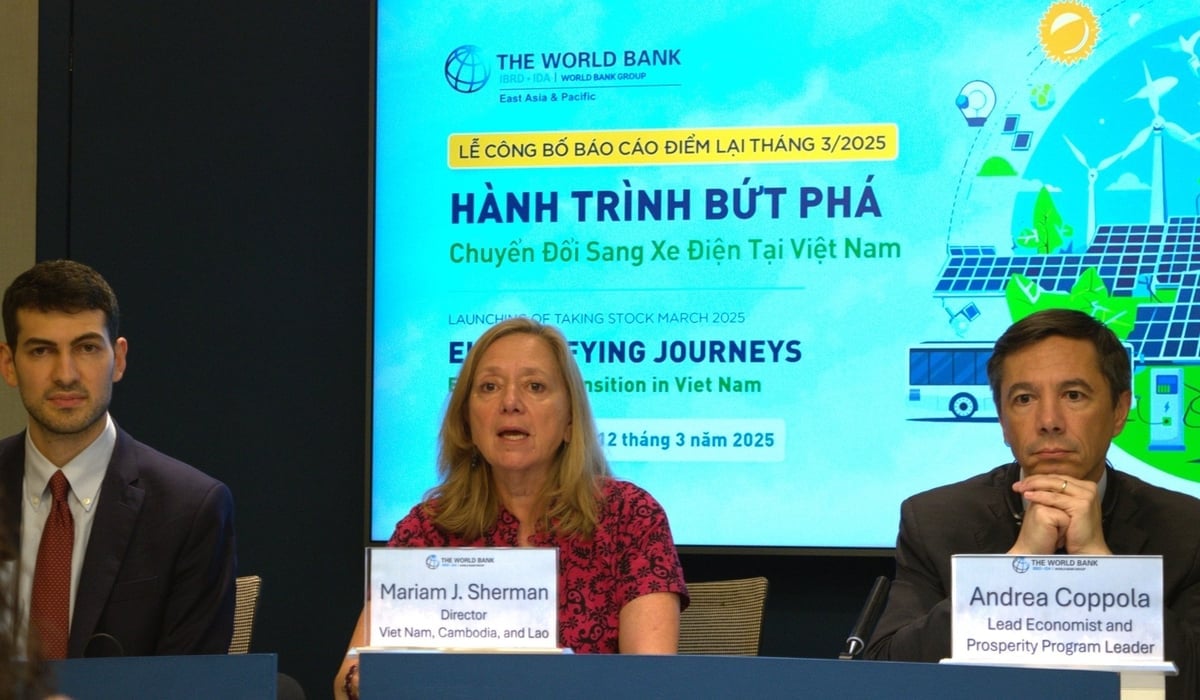
Mariam J. Sherman, World Bank Country Director for Viet Nam, Cambodia, and Lao PDR, speaks at the report launch ceremony. Photo: Trung Nguyen.
Commenting on the 8% growth target by 2025 set by the Vietnamese Government, Andrea Coppola, Lead Economist and Program Leader for Viet Nam, Cambodia and Lao PDR, said that it is achievable but requires a favorable international context, with strong momentum from major trade partners such as Europe and the United States.
The World Bank forecasts that in 2025, Vietnam will continue to grow rapidly and be one of the countries with high growth rates in Southeast Asia. The growth rate of 6.8% is based on the latest economic data in the first months of this year. For example, Vietnam's goods exports in the first two months of this year increased by about 8% compared to the same period last year, while in the first two months of 2024, the increase was 20% compared to 2023. This year's foreign direct investment (FDI) will only reach USD 2.2 billion, far lower than the USD 3.6 billion in the same period last year...
Due to the forecast of a short-term slowdown in economic growth in Vietnam's largest trading partners, China and the United States, exports, which have recovered well in 2024, are expected to slow down this year and continue to decline in 2026. The growth momentum will come from domestic economic and service activities, and in 2026, the real estate market will gradually recover thanks to faster project approvals. On the other hand, increased public investment will continue contributing to the total demand for goods and services and growth. Regarding domestic consumption, purchasing power has not yet reached expectations as consumers tighten spending in the context of cautious employment and income prospects.
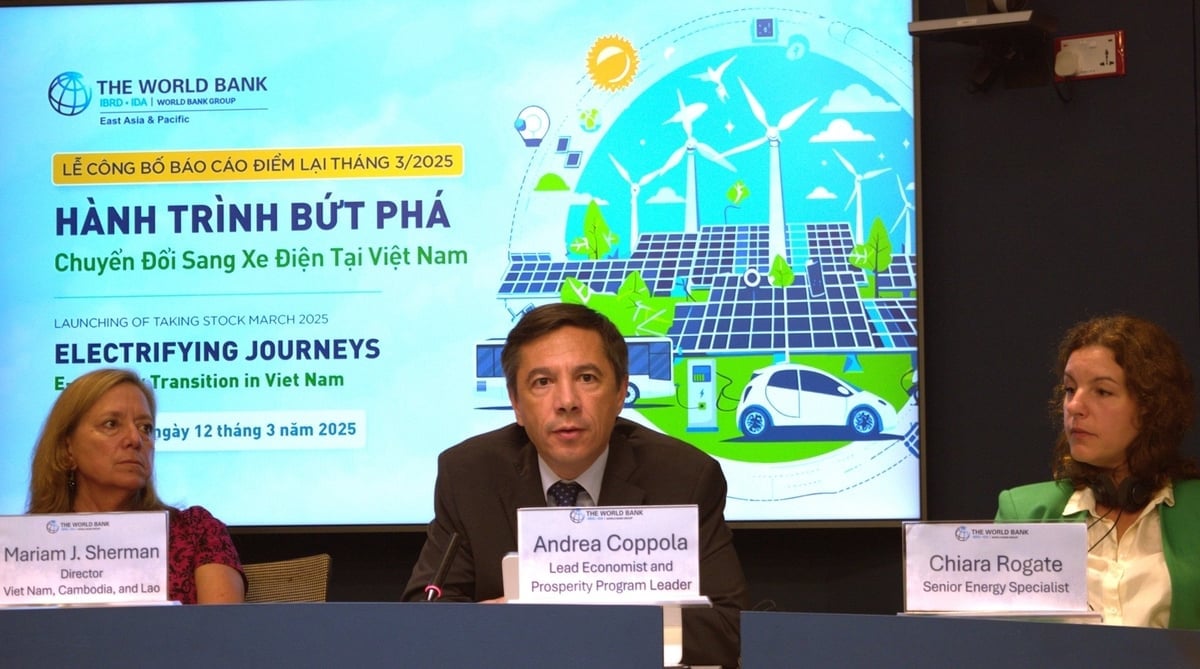
Andrea Coppola, Lead Economist and Program Leader for Viet Nam, Cambodia and Lao PDR, shares about the driving forces behind Vietnam's economic growth. Photo: Trung Nguyen.
The World Bank representative said that although the economy will grow steadily in 2025-2026, the current infrastructure shortage requires more investment if growth momentum is to be maintained in the following years. Vietnam's public debt level is still low compared to many countries in the region, and improvements in public investment management can help the state allocate necessary resources for investment, especially in energy, logistics, and transport.
In particular, it is essential to focus on increasing the supply of low-emission energy for economic growth in Vietnam's need to meet energy transition goals. If well applied, the indicators in the National Program on Energy Efficiency and Conservation for the 2019-2030 period (VNEEP 3) will improve productivity in sectors and reduce energy use, especially for industrial production.
This year, the World Bank has dedicated a special section to analyzing the transition to electric vehicles in Vietnam in its latest economic update, with an essential role in achieving the goal of net zero emissions by 2050.
The transport sector accounts for about 7.2% of the total greenhouse gas emissions of the Vietnamese economy, most of which are due to road transport. Although car ownership is still a luxury for most Vietnamese people today, the growth of the middle class has been increasing car sales with an average compound growth rate of up to 15% from 2010 to 2022, among the highest in the region.
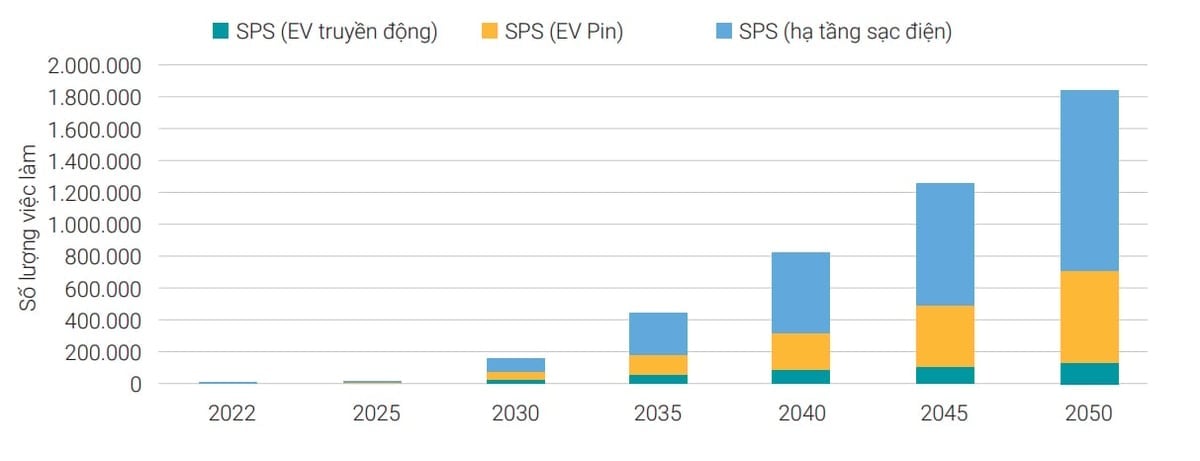
Jobs were created in the transition to electric vehicles under the World Bank's high decarbonization scenario. Photo: WB.
Vietnam is well-positioned to benefit from the start of the transition to car-based mobility and the leap from traditional cars to electric vehicles. Chiara Rogate, Senior Energy Specialist at the World Bank, said that in Vietnam, two-wheeled vehicles will remain the primary means of transport until 2035. Therefore, the transition must start with this segment. The transition to electric vehicles also presents great opportunities for economic development. The market demand for electric vehicles of all types is forecast to reach over 7 million units in 2024-2030 and 71 million units in 2031-2050.
In the immediate future, to accelerate the adoption of electric vehicles in the two-wheeled vehicle segment, the World Bank recommends that Vietnam implement safety standards, encourage high-performance batteries, and expand charging stations and battery swapping. At the same time, it introduces financial options and preferential prices to offset upfront costs. Electric vehicle sales in Vietnam are forecasted to explode from around 2035. Therefore, within the next 10 years, the power system infrastructure needs to be prepared to meet the increasing electricity demand and establish a fast charging network across the country.
Translated by Huong Giang

(VAN) Veterinary training should focus on quality, not just quantity. Veterinarians also need more options to pursue specialized training.

(VAN) The veterinary industry needs to be viewed objectively and further invested in to properly demonstrate its role and importance in the new context.

(VAN) The number of veterinarians graduating each year is not enough to meet actual needs, hence a difficult problem for the growing livestock industry.

(VAN) The strategic partnership between Cambodia, the Philippines, Vietnam, and CGIAR ensures that innovative solutions effectively address national priorities for food system development.

(VAN) This was affirmed by the UK Minister of State at the Department for Environment, Food and Rural Affairs during a working session with Deputy Minister Tran Thanh Nam on May 13.
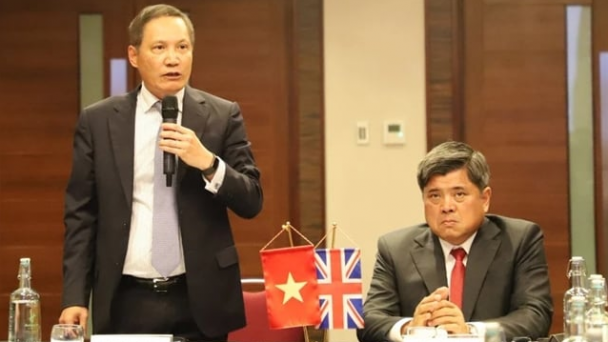
(VAN) On May 13, the Ministry of Agriculture and Environment, in coordination with the Embassy of Vietnam in the United Kingdom, organized a seminar titled 'Connecting trade in Vietnam-UK agricultural, forestry, and fishery products'.
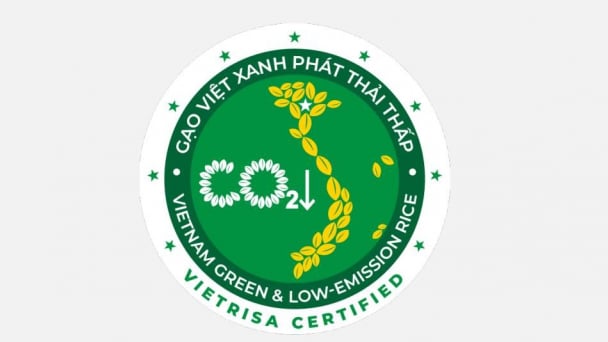
(VAN) The launch of the Vietnam green and low-emission rice brand is a positive signal for both businesses and farmers, marking readiness to reach new heights in the global market.